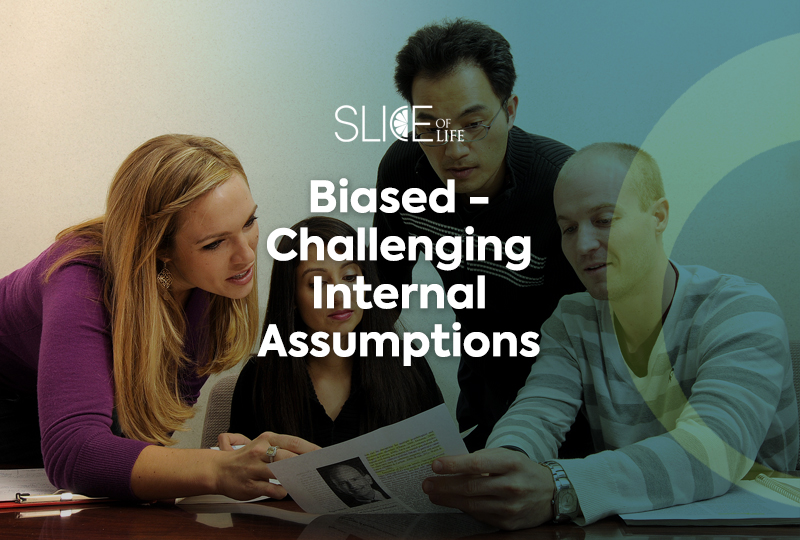The brain is designed to make split second decisions in an attempt to keep us safe from potential threats. This is a necessary and often unconscious function, categorizing the complex and unpredictable world around us into more manageable segments so we can figure out how to navigate and succeed. Unfortunately, in modern society, this natural process often translates to discriminatory behaviors that may or may not be understood without careful thought. The Harvard Business Review’s article “Are you aware of your biases?” starts the conversation about how conscientious individuals can check their biases at the door.
Biases are a phenomenon that can appear obvious when observed in other people, yet when it comes to ourselves, it is like we walk around with horse blinders. No one wants to think that they are biased, so they write off a sexist thought or an off-color joke as a fluke, not indicative of their true feelings. But it is important to deal with these prejudices head on and figure out how to cultivate an atmosphere where we are consistently striving to do better.
- Acknowledgment and Education
The first step to understanding personal biases is to take a personal inventory of yourself and examine your belief systems. Take time periodically to ask yourself poignant questions that can clarify where your current headspace is, such as:
- What are my core beliefs and belief systems? How might these beliefs impact how I see those I live and work with? These beliefs could be religious, racial, cultural or simply passed down through important connections.
- Is there a difference in how I react to people from backgrounds other than my own? Are there stereotypes or assumptions at play that are directed at a certain group or person?
- Do I acknowledge differences present in those around me, and if so, do I do this in an affirming way or a condescending tone that rings false?
- Would others describe me as biased, and if so, in what way?
- Are my words and actions aligned with my intentions?
- Am I able to be truly empathetic with others and imagine how it might feel to go through their diverse experiences, even if I have not had a similar experience?
The answers to these questions and others like it can serve as an audit to pinpoint areas of concern to improve upon and educate yourself.
- Welcome Challenges and Feedback
The world’s most dangerous people and leaders are often those that refuse to accept any outside points of view, assuming that they always know what is best. Every individual comes into this world more or less like a lump of playdough. Over the years, various experiences and observations we have made subtly shape our character and how we see the world, sometimes in the form of unseen smudges – biases – that impact our external behaviors. Friends from school, parents and grandparents, even our favorite movies – all this information and more presses onto the putty that makes us who we are. The trick is to identify what you truly believe and filter out negative biases that do not serve you. One way to do that is to be open to constructive feedback from others.
If someone approaches you with a concern about your beliefs and your actions, the natural response is to feel a bit ruffled up and defensive. Try to resist that urge, take a deep breath and try to shift your mindset. Attempt to create a mood of curiosity and positive intent. Here are some follow-up questions to ask when someone points out our biases or problematic behaviors you might have missed:
- Thank you so much for sharing that with me; I really appreciate it. Are there any other issues I should be aware of?
- I hadn’t thought of it this way before. Please tell me more.
- I am aware that we all have unconscious biases, so I appreciate you bringing this to my attention. Is there anything else I should know about the impact my actions have had?
Ideally, it is best to be proactive before an issue even arises. Make a point to reach out to a diverse group of people that know you and encourage them to give you honest feedback about where your blind spots are. People with fresh perspectives will be more likely to provide useful feedback you wouldn’t have suspected. Listen openly and remind yourself that honest feedback will help increase your self-awareness and positive growth.
Accountability is key to keep you on the right path once you have some weak areas in mind to address. Identify a trusted mentor or friend who will encourage you and that won’t be afraid to push you to stay committed to your goals.
- Celebrate Diverse Viewpoints
If your social, personal and professional circles of influence all look, sound and think like you, it is time to shake things up. It is almost impossible to maintain an unbiased perspective in a homogenous environment. If you feel that you need to expand your horizons, try being intentional to connect with those in your periphery that seem to have interesting perspectives. Join new social groups, read books or consume media that offers viewpoints that might differ from your own.
Life University is committed to maintaining a campus community and culture that allows for its members to feel welcomed, valued and respected. As we prepare our students to lead in the chiropractic and health science professions, we recognize our range of diversity to include culture, lifestyles, abilities, religions, socio-economic status, political systems and philosophies. For more information about our Office of Diversity, Equity & Inclusion, please visit this link.


Social Media